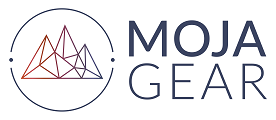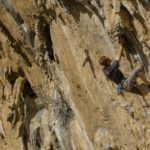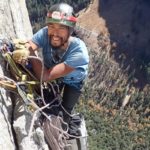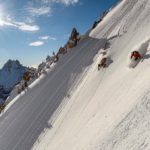Image: The author warming up on the Tyrolean Wall, in Tonsai, Thailand
Check out Chapter 1 and Chapter 3 of this three-part series by Jacob Bushmaker, founder of TheWanderingClimber.com.
In 2016, I left my home in Seattle and my respectable career as an engineer to pursue different goals far from that world. What started as a 3 month trip has evolved into 3 years, with no end in sight. As a result of my choice, I’ve had the incredible good fortune to have climbed in over 20 countries across 4 continents, while consistently moving up in grades.
In Step 1, we talked about setting epic goals that catapult you to action.
Step 2: Supercharge Your Performance With Proven Diet Hacks
“Absolute strength is less important in climbing than the ability to unleash your strength at the right time” -Fred Nicole
Unless you are genetically gifted, age 16, or just lucky, it will be nearly impossible to move up in grades if you are not careful about what you eat. Food is not only the fuel our body uses to perform, but it is also what it uses to repair and recover itself after.
It is very easy to overlook this when living on the road, when you’re away from your normal environment, but with a bit of planning and foresight, you can make healthy choices while at the same time speeding your recovery and helping you push grades!
Eat Copious Amounts Of Protein To Speed Recovery

On your next trip, consider supplementing protein into your diet
If you’re climbing multiple times a week, your body will constantly be struggling to recover lost energy and recuperate fatigued muscles.
But when it comes to recovery, it is super important to eat a healthy diet which includes a ton of protein.
Protein is the single most effective thing you can eat to maximize your grains and speed recovery.
Protein is most effective when consumed immediately after climbing. The best way to do this is with a protein bar or powder to be consumed immediately after climbing, or once you get back to camp.
If that’s not possible, here are some rules of thumb with protein consumption:
- Consume protein constantly throughout the day, as opposed to all at once
- Especially important to eat right after climbing
- 2nd most important time: right before bed
- Eat 1-1.5 grams of protein per kilogram of body weight per day
- Only consume high-quality protein sources, such as high-quality eggs and meats, and ‘clean’ protein powders without added sugar or carbs
Whenever I go on extended climbing trips, I now bring a bag of protein with me to consume immediately after climbing and right before bed.
When protein supplements can’t be found, I’ll normally resort to eating copious amounts of egg whites (often 6 to 8 eggs in a meal), as eggs can be found just about anywhere in the world. What I have noticed in the short term is that this reduces the gradual fatigue you feel after a few weeks of consistent hard climbing.
In the long term, protein consumption has well-documented benefits and will lead to notable strength gains.
Being The Right Weight at The Right Time

The Rhino in Hatun Machay, Peru
Weight management is a somewhat controversial issue in the climbing community. Most people who climb regularly will most likely already be in great shape and will have no “need” to lose weight… for health reasons that is.
However, the weight-to-strength ratio is an undeniable part of climbing, so the topic can’t be avoided. Constant dieting, however, can actually impede your climbing, especially if you’re doing any sort of intensive training.
For that reason, weight loss should be taken into account when you are nearing the end of a training cycle, or want to plan an extra “boost” of power, such as right before a trip or a hard RP attempt.
The 5-10 pounds of power gained after a few weeks of dieting might be the equivalent to the gains of power experienced from six months of training.
When a climb is right at your limit, a few pounds can make all the difference. If you are following a regimented training regime, cutting weight should start near the end of a training phase but before the “performance” or “sending” phase.
If you are not following a schedule, cutting should be started 2-3 weeks prior to a trip or the attempt of a difficult project. You should arrive at your destination at your “send weight,” and simply attempt to maintain the same weight while climbing.
This is a climbing “hack” which is super effective at helping you push your grades. Many of my hard sends have been after a few weeks of cutting. When I’m cutting, I personally shift to an almost 100% “raw” diet. I eat huge quantities of fruit and mainly vegetables for 2 to 3 weeks prior to my planned send.
Also during those weeks, I cut out all sugar, booze and processed food and drink copious amounts of water. This allows me to still eat until I’m full, not making me feel like I’m starving myself, in addition to allowing me to drop about 1-2 pounds a week.
Limit booze to jump-start a speedy recovery

The Moai of Fortescue Bay, Tasmania
No one here is going to argue how nice it is to have a cold one after a long day of climbing. Some climbers have even dubbed these “recovery beers,” implying that they actually speed up the recovery process.
The social scene around climbing destinations can make avoiding alcohol particularly difficult, as the local watering holes tend to not only be places to drink, but where we socialize, relax, buy gear, and resupply on food. Redpoint Climbers Supply, close to Smith Rock, or Edgardo’s Pizza at El Potrero Chico are just a few of the many examples or this.
Unfortunately, there is absolutely no evidence to back up the benefits of “recovery beers.” Generally speaking, alcohol should be avoided as much as possible, but there are two times in particular when it should be avoided.
1. Avoid alcohol immediately after climbing, when alcohol can actually impede your muscle recovery.
2. Avoid alcohol in the evenings prior to rest days, as alcohol consumption can cause you to slow the recovery your body desperately needs.
Avoiding alcohol at these two key times will have the largest effect on your recovery. For me, this is pretty simple. I hardly drink, but I drink absolutely no booze when I’m attempting to send a hard route or when I’m cutting weight before a climbing trip or send go.
Check out Chapter 3, the conclusion of this three-part series by Jacob Bushmaker.








